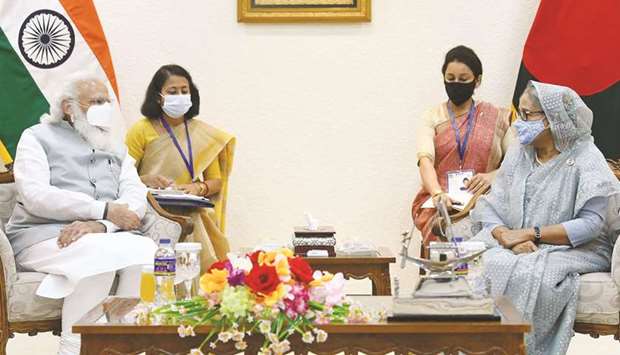At least five people were killed and dozens injured in police gunfire in eastern Bangladesh yesterday, a hospital doctor said, as security forces tried to quell protests against the visit of Indian Prime Minister Narendra Modi.
Hundreds of students from madrasas, or Islamic religious schools, clashed with police and border troops in the eastern Brahmanbaria district. Police said they had to open fire to control the violence.
Many Islamist groups in Bangladesh accuse Modi of alienating minority Muslims in Hindu-majority India. The two countries issued a joint statement celebrating their co-operation and partnership but the Bangladesh government made no comment about the protests.
“We received three bullet-hit dead bodies and two others succumbed to their injuries later,” Abdullah al-Mamun, a doctor at the government-owned Brahmanbaria General Hospital, told Reuters.
A local police officer confirmed five had died but declined to be named as he was not authorised to speak to media. Bangladeshi police did not officially confirm the death toll.
Protests raged across Bangladesh against Modi but also over the police killing of Islamists who had demonstrated against his two-day visit.
Four supporters of the Islamist group Hefazat-e-Islam were killed on Friday after police opened fire when protesters allegedly attacked a police station in the southeastern town of Chittagong.
Dozens were also hurt in the capital Dhaka on Friday when police used rubber bullets and teargas in clashes with protesters.
Yesterday, hundreds of members of Hefazat-e-Islam and other Islamist groups marched through Chittagong and Dhaka protesting the deaths of their supporters.
“Police opened fire on our peaceful supporters,” the group’s organising secretary Azizul Haque told a rally in Chittagong. “We will not let the blood of our brothers go in vain.”
Hefazat-e-Islam, which translates as Protection of Islam, has called for a nationwide strike today to protest the killings.
Non-profit group Amnesty International also criticised the police action in Chittagong.
“The right to peaceful protest has come under concerted attack, particularly during the coronavirus pandemic, culminating in this type of bloody repression,” Sultan Mohammed Zakaria, Amnesty’s south Asia researcher, said in a statement.
Modi landed in Dhaka on Friday, his first international trip since the outbreak of the coronavirus pandemic last year, to celebrate the 50th anniversary of Bangladesh’s independence.
He left the country yesterday after holding talks with Bangladesh Prime Minister Sheikh Hasina.

Indian Prime Minister Narendra Modi (left) with his Bangladeshi counterpart Sheikh Hasina during their meeting in Dhaka yesterday. (AFP)
